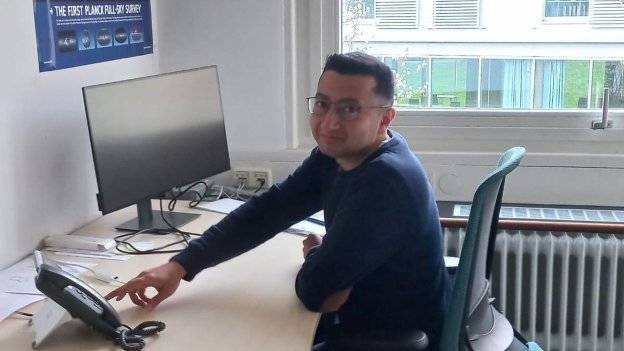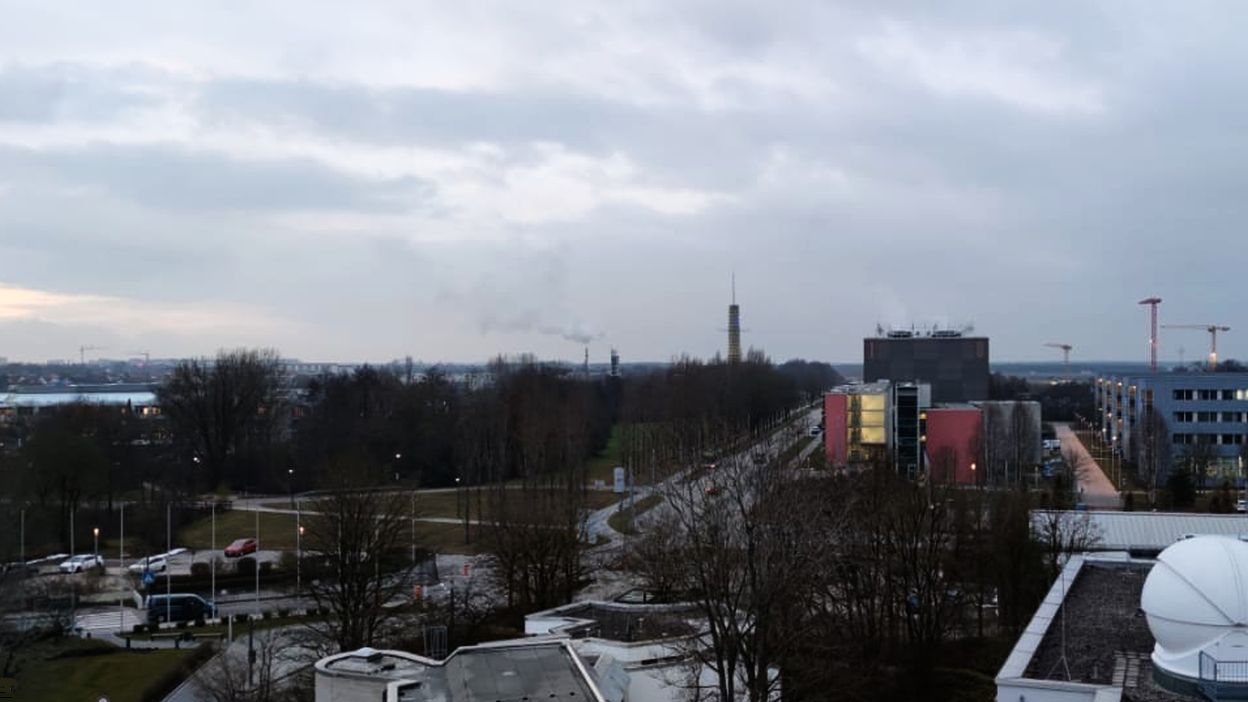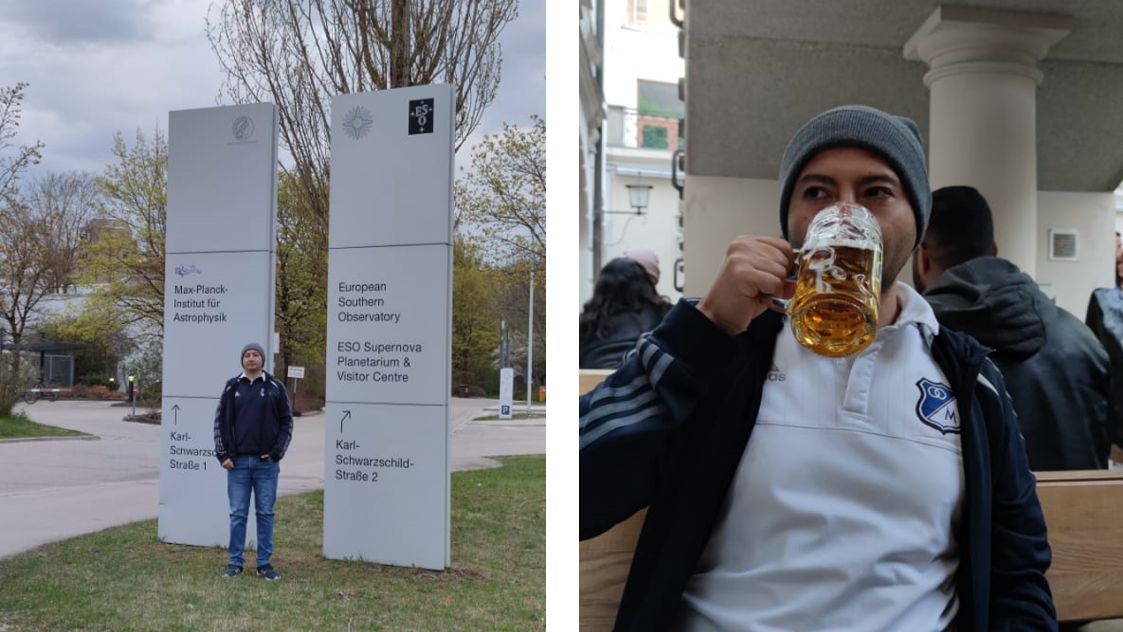Hector Hortua Orjuela
 Privat
Privat
Hector Hortua Orjuela in his office at MPA
"It is an incredible honor for me to have been awarded with the UNICORE Scholarship by the DAAD-Stiftung which allowed me to conduct my research in Germany and gain valuable intercultural experiences away from home. Thank you for this unforgettable experience."
Hector Hortua Orjuela works in the field of Astrophysics. A UNICORE Scholarship he was awarded with by the DAAD-Stiftung allowed him to conduct research at the Max Planck Institute for Astrophysics (MPA) in Garching, Munich.
In the following, he talks about his research in Munich:
Thanks to the DAAD-Stiftung, I could carry out a collaborative research project at one of the foremost international research organizations in the world, the Max Planck Institute. During my stay in Garching, Germany, I was enrolled in the group of Information Field Theory (IFT) led by Professor Torsten Enßlin. IFT group focuses one of its lines of research on the construction of the conceptual and mathematical framework of IFT and its application to many disciplines, specifically in Cosmology and high energy Astrophysics. Moreover, an overlapping of IFT with Artificial intelligence (AI) and machine learning (ML) methods has also been developed. One example is generative models which describe how a dataset is generated in terms of probabilistic models. I was interested in working in this direction as during the last three years I have been working on the applications of AI in Cosmology.
My first week in Germany started with a short tour of the Max Planck Institute Garching campus. I walked across the Max Planck Institute for Extraterrestrial Physics, Plasma Physics, Quantum Optics, and finally, the Max Planck Institute for Astrophysics (MPA), where I stayed throughout the scholarship.
Furthermore, I was introduced to the group of Information Field Theory (IFT), where I met with excellent researchers and students who gave me a warm welcome. In addition, Professor Torsten kindly invited me to attend the Information Field Theory lecture offered by the Ludwig-Maximilians-Universität München.

Privat
Max Planck Institute Garching Campus; photo taken from the rooftop of the MPA
During my stay at MPA, I focused my research on the use of generative models such as Variational AutoEncoders and Normalizing Flows in order to encode the information of several Galactic emission maps into an independent and reduced set of feature maps. These maps would capture vital information not only to elucidate astrophysical environments but also to reconstruct the initial signal. Progress reports were shared at the IFT group seminars weekly with the purpose of staying informed about new developments and challenges faced during the research. I found that our algorithm successfully recognized the most significant sky emission components across the full spectrum, and it also identifies the spatial structure in the features maps. These are promising results for the all-sky observation analysis because this approach outperforms the current pixel-based technique used most frequently in the papers.
At MPA, I found a place where I had the opportunity to interact with people recognized for their notable expertise in their fields of research, to attend conferences centered on wide topics, and where I felt how incredible it is being able to be immersed in a cutting-edge research environment. As an anecdote, I had the opportunity to personally attend the conference where the Event Horizon Telescope (EHT) collaboration presented to the world the first image of the supermassive black hole at the center of our own Milky Way galaxy, Sagittarius A*! For me, it was an honor to be enrolled at the MPA in this short period, work with the IFT group, and acquire significant knowledge from Prof. Torsten. I will keep in my mind all those moments where I had lunch outdoors together with my colleagues, discussing the challenges we had found in our research, and at same time, enjoying the pretty sight and a comfortable weather. I might conclude that being immersed in such a pleasant atmosphere, surrounded by brilliant and friendly colleagues, indeed motivates you to be focused on your research and love even more what you do. I am sure that all this experience will help me to keep growing personally and professionally.

Privat
At work at Max Planck Institute Garching Campus and in his leisure time at Hofbräuhaus in Munich
Outside academia, I can affirm that Munich is a lovely place to stay and live. It combines a sense of peace and serenity expected from the countryside, with the luxury and comfort of a modern city. The public transportation system in Munich is well organized making life easier for everyone, and its atmosphere provides a feeling of safety wherever you are walking in. I liked to visit several places in my free time, such as the BMW museum, Sea Life Munich, Hellabrunn Zoo and the FC Bayern stadium, while walking down the city center at night was also an enjoyable experience. Marienplatz, the heart of the city of Munich, is definitely a fantastic place to walk around, to be impressed with the architecture and multicultural diversity. I was surprised how many languages you can hear in a unique place, and even more astonished is the talent of waitresses at Hofbräuhaus being able to carry up to ten liters of beer at a time through the tavern.
I would like to express my sincere gratitude to the entire DAAD-Stiftung team and the UNICORE Forum e.V.; to Maria Depner, secretary of MPA; to Prof. Torsten and Jakob Knollmüller along with all the IFT group, and to everyone who made this scholarship possible.
As of September 2022. The English version is the original.


